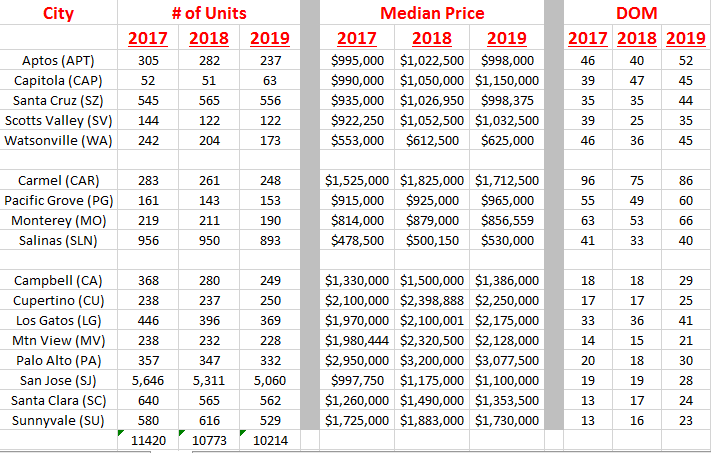January 2020
Federal Spending Bill Passes, includes tax breaks
Included in the package are temporary extensions of three tax provisions directly impacting the real estate industry:
1. the exclusion of forgiven mortgage debt from gross income, meaning that owners of primary residences who sold them short and had part of their mortgage debt written off will not have to pay tax on the amount forgiven
2. the deductibility of premiums for mortgage insurance; and
3. the deduction of the cost of improvements to commercial buildings that make them energy efficient. These are retroactive to the beginning of 2018, and through the end of 2020.
Housing shortage "no joke"
"Does it feel like all your friends are moving out of state? It's because they are," reports SF Gate.
"We've got more than goodbye parties and U-Haul shortages as evidence: Newly released census data shows approximately 691,000 people moved from California to another U.S. state in 2018. About 501,000 people moved from another state into California over the same time period."
"It's the seventh year in a row that more people have left the state than moved in, reports KNTV."
"Even for those hanging on to the California dream, more than half are considering leaving, according to a recent UC Berkeley poll. As for why people keep moving out of the Golden State, there's no real surprise there: The high cost of housing was the number one reason cited."
And then there's this...a new report from the California Association of REALTORS shows you need a household income of $309,600 just to afford the median-priced home in San Francisco County. You need at least $127,000 to afford the median-priced home in California.
The bottom line: "State legislators need to get serious about solving the housing supply shortage.
News Laws in California for 2020
From minimum wages to housing restrictions, here are some of the laws going into effect in 2020:
The new law aimed at combating the housing crisis in California limits rent increases to 5% each year, plus inflation until Jan 1, 2030. The law bans landlords from evicting people for no reason, making it illegal to force people out so they can raise the rent for a new tenant. The law also applies to rent increases on or after Mar 15, 2019. The new law does not apply to housing built within the last 15 years, does not apply to single-family homes except those owned by corporations or real estate investment trusts, and does not cover duplexes where the owner lives in one of the units.
870 all toll. Californians may now ask to see all kinds of personal details that businesses operating in the state have compiled on them. The law covers ride-hailing services, retailers, cable TV companies, mobile service providers and other companies that collect personal data for commercial purposes and meet certain conditions. These include companies that collect the personal information of 50,000 people or more every year as well as businesses with annual revenues above $25 million.
The law grants people in the state the right to see the categories of personal data, like smartphone locations or voice recordings, that a company has on them. They also have the right to know what kinds of third parties (like app developers) a company has obtained their information from or sold it to.
California residents have the right to see the specific pieces of personal information a company has compiled about them, too. That may include detailed logs of a person's online activities, physical locations, ride-hailing routes, biometric facial data and ad-targeting data.
The law also entitles individuals to see the specific inferences that have been made about them-including predictions or categorizations related to a person's behavior, attitudes, psychology, intelligence or abilities.
For security purposes, companies may ask for a copy of a consumer's driver's license or other form of identification before they fulfill a data request.
Other areas of the law to understand:
Comments: What a difference in some years and others not so much. Total # of units sold were down over 3 years, and 13 out of 17 areas showed drops yr over yr since 2017. Days on the market was up in 12 out of 17 areas, yr over yr since 2017. The Median price in 2019 was lower than 2018 in 12 out of 17 areas and yet all areas were higher than 2017. Five areas were up in price three years in a row, IE: Capitola, Watsonville, Pacific Grove, Salinas and of course Cupertino. Display of MLS data is deemed reliable but is not guaranteed accurate by the MLS.
California Consumer Privacy Act (CCPA)-the nation's toughest privacy law (but is it enough?)
1. The right to know about employee data
2. The right to delete personal data
3. The right to opt-out of the sale of data
4. Parents' rights regarding their children's data
3 YR Sales Comparisons for the Bay Area and the Central Coast


